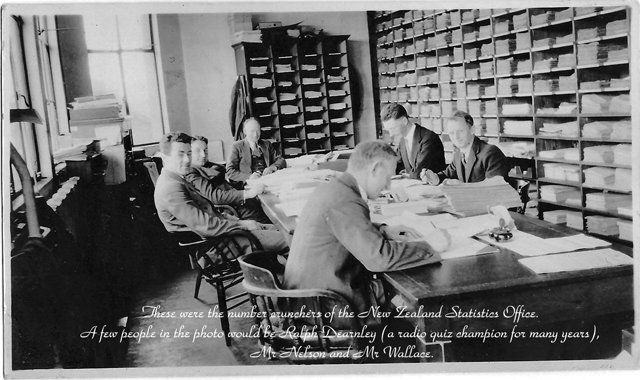The Wellington “Wizard of Quiz”
Ernest Ralph Dearnley
|
17 Dec 1969 - Third World Quiz Win In A Row To N.Z. The Wellington “wizards of quiz”, Mr E. R. Dearnley and Mr J. W. Winchester, took New Zealand to its third successive win in the world radio quiz programme, “World Quiz ‘69,” on Saturday night. The show is broadcast on the national programme and the New Zealanders competed with teams from Britain and Australia. In the final programme of a 13-week series the local pair won with a final score of 379 points over Britain. 333. and Australia. 270. What makes a world-class brain of this nature? Ralph Dearnley is a bachelor— when he spoke by telephone from Wellington last night he was cooking dinner for “myself and the cat.” A master of arts in mathematics—”for some odd reason pure maths are considered an art whereas applied maths are a science; or they were in my day”— Mr Dearnley is also a bachelor of science. |
|
Interests Varied
He is interested in all sorts of subjects but especially current affairs. He says he has always read almost anything but has begun to read more ideas and less fiction as be has grown older. — “most especially history and scientific matters.” Mr Dearnley works as a biometrician (biometrics or the measurement of living things) for the Department of Agriculture and describes his work as being the application of statistical methods to agricultural problems. He denies a photographic memory in its accepted sense. “I can equally well remember facts that come orally—and that is the correct word, I don’t mean verbal, misuse of language is one of my peeves—as those that I read” Reads Nearly Anything His colleague, Jim Winchester is a master of arts in history. He is married, with a two-year-old son. He - works as an advisory officer—”clerk actually, but the phraseology is more grandiloquent than it used to be”—in the Department of Industries and Commerce. Mr Winchester, too, renounces the theory of photographic memory “I believe it can apply with artist who can memorise perfectly and subsequently paint a perfect reproduction of a tree but it doesn’t apply with the written word.” He claims his knowledge to be more superficial than that of his partner’s: “Ralph, for example, can work out meanings of words from their Greek or Latin roots. I can’t, which speaks for a classical education. I don’t read as much as I did—with the baby and, the garden and everything—but I still read a fair amount.” “At the moment I’m working my way through Trollope, I’m about a third of the way through. But usually I’ll read just about anything” Mr Winchester attributes some of the pair’s continuing success to an increasing anticipation of the line of questioning. “We know, for example, that the questions are usually set some two days before the programme and that many of them will concern topical events. By careful reading we can prepare accordingly. After a while, too, you get to know the question writer’s mind and interests—rather like someone who regularly completes crosswords can get to know the setters quirks and tastes.’’ Some From Cranks Letters frequently arrive at the homes of both of the team—some from cranks, some indignant and some seeking advice. “Both team and answer have been proved wrong on occasions by knowledgeable correspondents,” said Mr Winchester. “In one programme we were asked who was the last Chancellor of Germany immediately before Hitler. The answer given, and accepted as correct, was Von Papen. An irate correspondent soon let us know that the correct answer was Von Schleicher. “Other corrections have come in on such differing subjects as God’s promise to Abraham and Cinderella’s glass slipper.” Very often, too, the pair are called upon, telephoned or written to for advice in their capacity as “brains” in rather the same way that people write to E. C. Marshall of “The Defenders” for legal advice simply because his role portrays him as a lawyer. “We help if we can” says Mr Winchester. ‘‘Very often people ring up to ask me to settle a bet (one recent caller asked if there was, in fact, a Peruvian language) and kids even call to get answers to their homework problems. It can get a little heavy at times but normally I’m only too pleased to help out.” And what of the future? The three-country quiz teams will be linked again on Christmas Day for a similar programme but it lighter vein. How much lighter? “Joan Clark (the producer) was thinking at one time of getting us all to sing carols,” said Mr Dearnley thoughtfu1ly, “but I hope for every one’s sake that it doesn’t turn out quite like that.” ------------------------- ‘King of Quiz’ Dies at 72 10 Aug 1987 NZPA Wellington Mr Ralph Dearnley, the former New Zealand ‘king of quiz’, has died in Warsaw. Mr Dearnley, aged 72, of Wellington, had been in Poland for the World Esperanto Congress and was about to go on a holiday. A regular panelist on the now-defunct National Programme quiz show Stump the Brains Trust. Mr Dearnley held numerous prizes for his performances at quiz contests. source: Many thanks to Mathew Dearnaley for this item |
 |
 Ralph Dearnley is believed to be 3rd from left, at the far end of the table |
 |